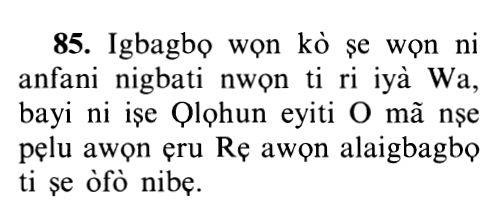40vs85
Select any filter and click on Go! to see results
فَلَمْ يَكُ يَنفَعُهُمْ إِيمَانُهُمْ لَمَّا رَأَوْا بَأْسَنَا سُنَّتَ اللَّهِ الَّتِي قَدْ خَلَتْ فِي عِبَادِهِ وَخَسِرَ هُنَالِكَ الْكَافِرُونَ
Falam yaku yanfaAAuhum eemanuhum lamma raaw basana sunnata Allahi allatee qad khalat fee AAibadihi wakhasira hunalika alkafiroona
Index Terms
Click to play
Yoruba Translation

Hausa Translation
To ĩmaninsu bai kasance yanã amfaninsu ba a lõkacin da suka ga azãbarMu. Hanyar Allah wadda ta gabãta a cikin bãyinSa. Kuma kãfirai sun yi hasãra a can.
Asbabu n-Nuzuul (Occasions of Revelation)
Allah says here:
فَلَمْ يَكُ يَنفَعُهُمْ إِيمَانُهُمْ لَمَّا رَأَوْا بَأْسَنَا سُنَّتَ اللَّهِ الَّتِي قَدْ خَلَتْ فِي عِبَادِهِ ...
Then their Faith could not avail them when they saw Our punishment. (Like) this has been the way of Allah in dealing with His servants.
means, this is the ruling of Allah concerning all those who repent only when they actually see the punishment: He does not accept that from them.
It is said in the Hadith:
إِنَّ اللهَ تَعَالَى يَقْبَلُ تَوْبَةَ الْعَبْدِ مَالَمْ يُغَرْغِر
Allah will accept the repentance of His servant so long as the death rattle is not sounding in his throat.
Once the death rattle is sounding and the soul has reached the throat, and the dying person actually sees the angel (of death), then he can no longer repent.
Allah says:
... وَخَسِرَ هُنَالِكَ الْكَافِرُونَ ﴿٨٥﴾
And there the disbelievers lost utterly.
This is the end of the Tafsir of Surah Ghafir. Praise and thanks be to Allah.
قال تعالى " فلم يك ينفعهم إيمانهم لما رأوا بأسنا سنة الله التي قد خلت في عباده " أي هذا حكم الله في جميع من تاب عند معاينة العذاب أنه لا يقبل ولهذا جاء في الحديث " إن الله تعالى يقبل توبة العبد ما لم يغرغر " أي فإذا غرغر وبلغت الروح الحنجرة وعاين الملك فلا توبة حينئذ ولهذا قال تعالى " وخسر هنالك الكافرون " .
"فلم يك ينفعهم إيمانهم لما رأوا بأسنا سنة الله" نصبه على المصدر بفعل مقدر من لفظه "التي قد خلت في عباده" في الأمم أن لا ينفعهم الإيمان وقت نزول العذاب "وخسر هنالك الكافرون" تبين خسرانهم لكل أحد وهم خاسرون في كل وقت قبل ذلك
فلم ينفعهم إيمانهم بالله عند معاينة العذاب وحين رأوا البأس .
I'raab - grammatical analysis of the Qur'an
«فَلَمْ يَكُ» الفاء حرف استئناف ومضارع مجزوم بلم وعلامة جزمه السكون المقدر على النون المحذوفة واسمه مستتر «يَنْفَعُهُمْ إِيمانُهُمْ» مضارع مرفوع ومفعوله وإيمانهم فاعله والجملة خبر يك وجملة لم يك مستأنفة «لَمَّا» ظرفية بمعنى حين «رَأَوْا بَأْسَنا» ماض وفاعله ومفعوله والجملة في محل جر بالإضافة «سُنَّتَ» مفعول مطلق «اللَّهِ» لفظ الجلالة مضاف إليه «الَّتِي» صفة لسنة «قَدْ» حرف تحقيق «خَلَتْ» ماض فاعله مستتر «فِي عِبادِهِ» متعلقان بالفعل والجملة صلة «وَخَسِرَ» حرف استئناف وماض «هُنالِكَ» اسم إشارة في محل نصب على الظرفية المكانية «الْكافِرُونَ» فاعل مرفوع بالواو والجملة مستأنفة.
